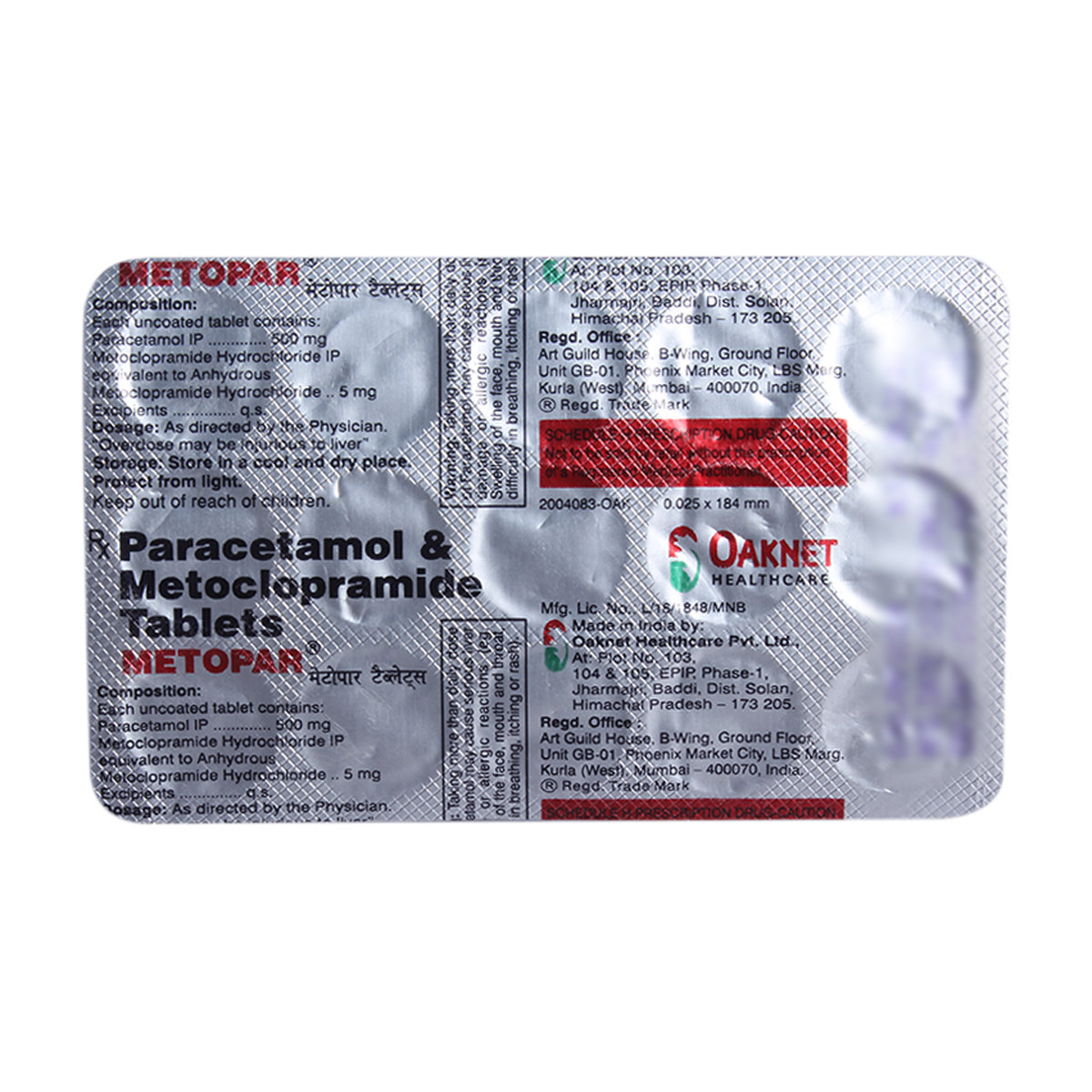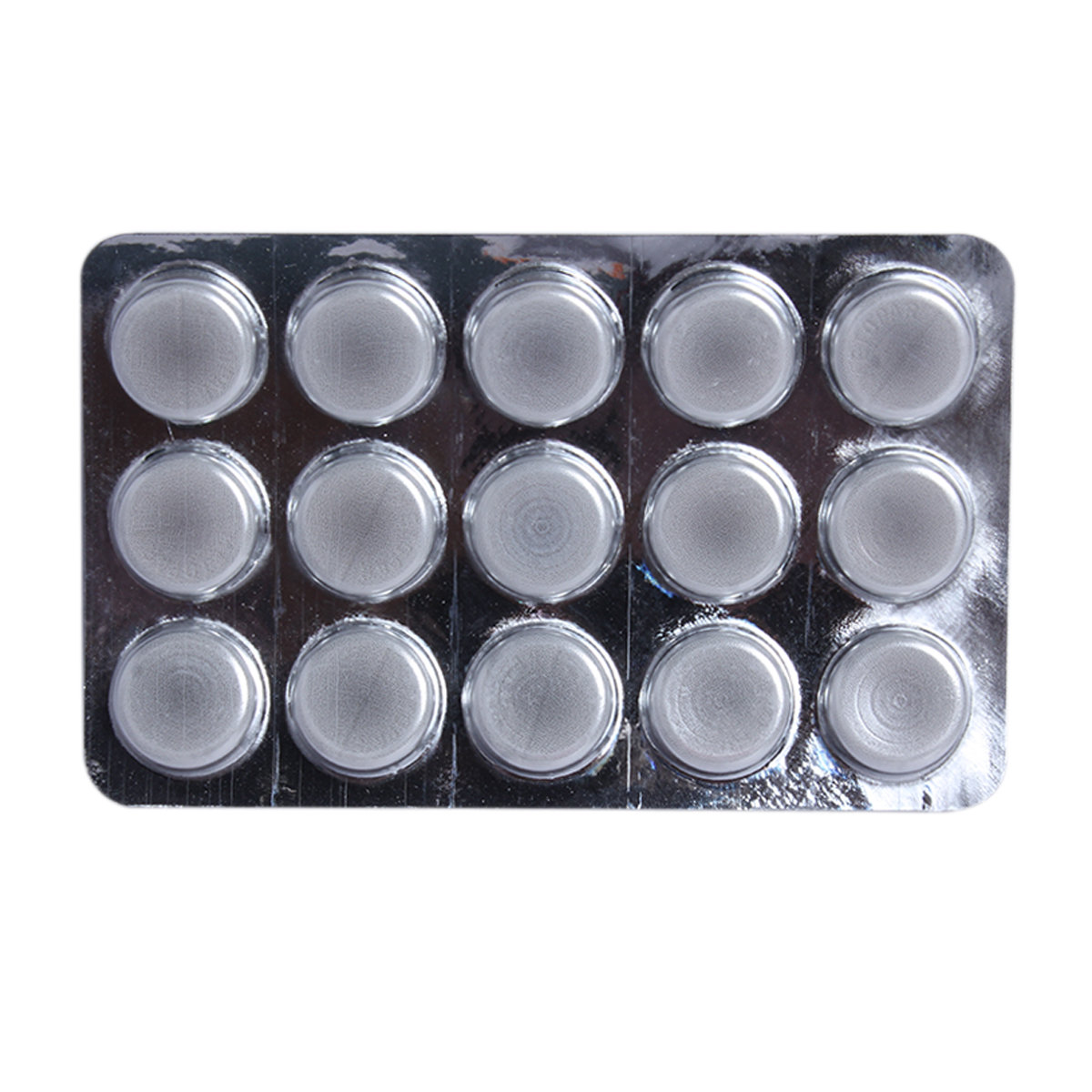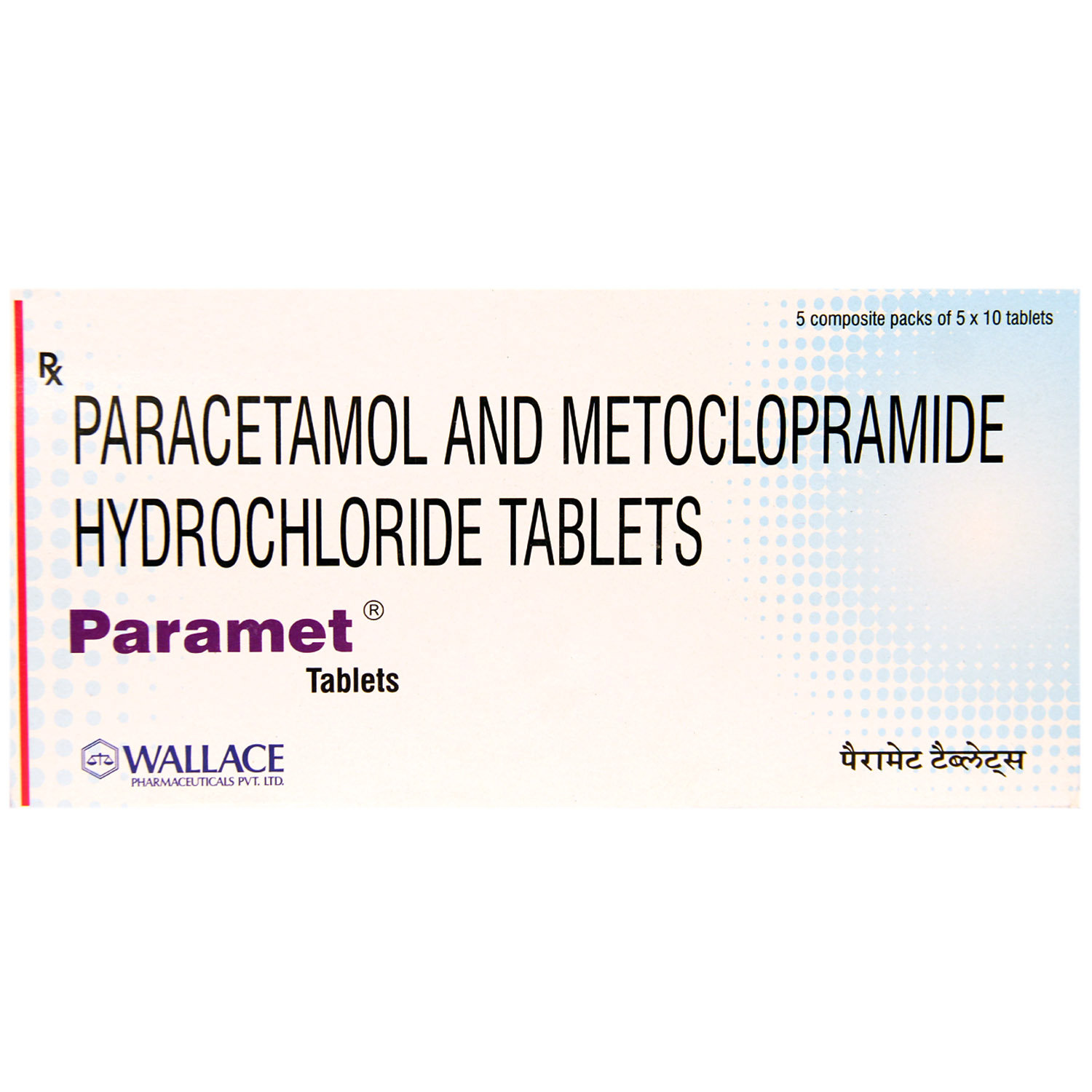Metopar Tablet 15's
MRP ₹50.5
(Inclusive of all Taxes)
₹7.6 Cashback (15%)
Provide Delivery Location
Online payment accepted
 Prescription drug
Prescription drugWhats That
Composition :
Manufacturer/Marketer :
Consume Type :
Expires on or after :
Return Policy :
About Metopar Tablet
Metopar Tablet belongs to the group of medicines called anti-migraine agents used to treat signs of migraine such as headache, being sick (vomiting), and feeling sick (nausea). Migraine is a neurological condition which is characterised by an intense pulsating, throbbing, pounding, debilitating headache which generally occurs on one side of the head; however, it can occur on both sides or shift.
Metopar Tablet is a combination of two drugs: Metoclopramide (anti-emetics) and Paracetamol (analgesics). Metoclopramide works on the part of the brain and prevents the symptoms of nausea and vomiting. It also works on the muscles in the upper part of the digestive system, this helps in emptying the stomach. Paracetamol works by blocking the effect of a chemical messenger known as prostaglandins which cause pain. Together Metopar Tablet helps in relieving the symptoms of migraine.
Take Metopar Tablet as prescribed. You are advised to take Metopar Tablet for as long as your doctor has prescribed it for you depending on your medical condition. In some cases, you may experience certain common side-effects such as dizziness, sleepiness, diarrhoea, irregular periods, weakness, nervousness and breast enlargement in men. Most of these side-effects do not require medical attention and will resolve gradually over time. However, you are advised to talk to your doctor if you experience these side-effects persistently.
Consult your doctor before taking Metopar Tablet if you are pregnant or breastfeeding. Metopar Tablet should not be taken during the first 6 months of pregnancy. Metopar Tablet may cause drowsiness and sleepiness, so drive with caution. Metopar Tablet is not recommended for children below 18 years as safety and efficacy have not been established. Avoid consuming alcohol with Metopar Tablet as it could lead to increased drowsiness and sleepiness. Inform your doctor about your health condition and medicines you are taking to rule out unpleasant side-effects.
Uses of Metopar Tablet
Directions for Use
Key Benefits
Metopar Tablet is a combination of two drugs, namely: Metoclopramide and Paracetamol. Metopar Tablet is used to treat migraine signs such as headache, being sick (vomiting) and feeling sick (nausea). Metoclopramide is an anti-emetic that works on the part of the brain, thereby prevents the symptoms of nausea and vomiting. It also works on the muscles in the upper part of the digestive system, this helps in the emptying of the stomach. Paracetamol is an analgesic that works by blocking the effect of a chemical messenger known as prostaglandins which cause pain. Thereby, helps in relieving pain. Together Metopar Tablet helps relieve the symptoms of migraine such as headache, nausea and vomiting.
Storage
Drug Warnings
Do not take Metopar Tablet if you are allergic to any of its contents; if you have/had blockage or bleeding in your stomach, epilepsy/fits, phaeochromocytoma (tumour of the adrenal gland), uncontrollable movements of the face, arms or legs after taking metoclopramide or medicines used to calm mental problems, if you had an operation on stomach or intestine or if you are taking levodopa. Inform your doctor before taking Metopar Tablet if you have/had severe kidney or liver problems; if you are 65 years or older. Consult your doctor if you are pregnant or breastfeeding. Metopar Tablet should not be taken during the first 6 months of pregnancy. Metopar Tablet may cause sleepiness and dizziness, so drive only if you are alert. Metopar Tablet is not recommended for children below 18 years as safety and effectiveness have not been established. Avoid consuming alcohol with Metopar Tablet as it could lead to increased sleepiness. Metopar Tablet contains paracetamol, do not take any other medicines containing paracetamol along with Metopar Tablet unless prescribed.
Drug-Drug Interactions
Drug-Drug Interactions
Login/Sign Up
Co-administration of Metopar Tablet with Bupropion can increase the levels of Metopar Tablet and increase the risk or severity of developing seizures (fits).
How to manage the interaction:
Taking Metopar Tablet with Bupropion is generally avoided as it can result in an interaction, it can be taken if a doctor has advised it. Do not discontinue any medications without consulting a doctor.
Co-administration of Metopar Tablet with Clozapine can increase the risk of side effects.
How to manage the interaction:
Taking Metopar Tablet with Clozapine is generally avoided as it can possibly result in an interaction, it can be taken if your doctor has advised it. Do not discontinue any medications without consulting a doctor.
Coadministration of Fluvoxamine with Metopar Tablet increases the risk of serotonin syndrome(a condition in which a chemical called serotonin increases in your body).
How to manage the interaction:
Taking Fluvoxamine with Metopar Tablet is not recommended, as it can lead to an interaction, it can be taken if prescribed by your doctor. Do not stop using any medications without a doctor’s advice.
Using Metopar Tablet with Paroxetine can cause serotonin syndrome. Serotonin syndrome is a condition in which a chemical called serotonin builds up in your body, causing signs and symptoms ranging from mild (shivering and diarrhoea) to severe (muscle rigidity, fever, and seizures).
How to manage the interaction:
Taking Metopar Tablet with Paroxetine is not recommended, as it can possibly lead to an interaction, it can be taken if prescribed by your doctor. Do not stop using any medications without a doctor’s advice.
Coadministration of Metopar Tablet with Pimozide can increase the risk of negative side effects.
How to manage the interaction:
Taking Pimozide with Metopar Tablet is not recommended, as it can possibly lead to an interaction, but it can be taken if prescribed by the doctor. However, if you experience muscle pain or movements that you can't stop or control, such as lip smacking, chewing, puckering, frowning or scowling, tongue thrusting, teeth clenching, jaw twitching, blinking, eye-rolling, shaking or jerking of arms and legs, tremor, jitteriness, restlessness, pacing, and foot tapping, consult a doctor. Do not stop using any medications without a doctor’s advice.
Co-administration of Metopar Tablet with Risperidone can increase the risk of side effects like uncontrolled movement disorder.
How to manage the interaction:
Taking Risperidone with Metopar Tablet is not recommended as it can possibly result in an interaction, it can be taken if your doctor has advised it. If you notice any of these symptoms like muscle spasms or movements that you can't stop or control, such as lip smacking, chewing, puckering, frowning or scowling, tongue thrusting, teeth clenching, jaw twitching, blinking, eye-rolling, shaking or jerking of arms and legs, shaking, jitteriness, restlessness, pacing, and foot tapping contact a doctor immediately. Do not stop using any medications without a doctor’s advice.
Taking Metopar Tablet with Ziprasidone can increase the risk of side effects like uncontrolled movement disorder.
How to manage the interaction:
Taking Metopar Tablet with Ziprasidone is not recommended, but it can be taken together if prescribed by a doctor. However, consult your doctor if you experience lip-smacking, chewing, puckering, frowning or scowling, tongue thrusting, teeth clenching, jaw twitching, blinking, eye-rolling, shaking or jerking of arms and legs, tremor, jitteriness, restlessness, pacing, and foot tapping. Do not discontinue any medications without consulting a doctor.
Coadministration of Metopar Tablet with Venlafaxine might raise serotonin hormone levels in the body, affecting the brain and nerve cells. Increased serotonin hormone can lead to side effects.
How to manage the interaction:
Taking Metopar Tablet with Venlafaxine together is generally avoided as it can possibly result in an interaction, it can be taken if your doctor has advised it. Do not discontinue any medications without consulting a doctor.
Co-administration of Metopar Tablet with Trifluoperazine can increase the risk of side effects like uncontrolled movement disorder.
How to manage the interaction:
Taking Metopar Tablet with Trifluoperazine is generally avoided as it can possibly result in an interaction, it can be taken if your doctor has advised it. However, if you experience muscle spasms or movements that you can't stop or control, such as lip smacking, chewing, puckering, frowning or scowling, tongue thrusting, teeth clenching, jaw twitching, blinking, eye-rolling, shaking or jerking of arms and legs, tremor, jitteriness, restlessness, pacing, and foot tapping., contact your doctor immediately. Do not discontinue any medications without consulting a doctor.
Co-administration of Metopar Tablet with Aripiprazole can increase the risk of side effects.
How to manage the interaction:
Taking Aripiprazole with Metopar Tablet is generally avoided as it can result in an interaction, it can be taken if a doctor has advised it. Do not discontinue any medications without consulting a doctor.
Drug-Food Interactions
Drug-Food Interactions
Login/Sign Up
Diet & Lifestyle Advise
- Maintain a healthy diet and exercise regularly as it helps in improving overall health and boosts self-esteem.
- Avoid bright lights, loud noise, and extreme temperatures.
- Perform meditation and yoga. This helps in relieving stress and provides relaxation.
- Follow a regular sleep pattern to improve the amount and quality of sleep you get.
- Massage your scalp to ease the pain.
- Lie down in a quiet, dark room.
- Place a cold cloth over your forehead or neck.
- Avoid smoking, alcohol, and caffeinated drinks.
- Learn what triggers your migraine and try avoiding them.
- Stay hydrated. Drink plenty of fluids.
- Learn relaxation skills as they help in reducing stress.
Side Effects of Metopar Tablet
- Dizziness
- Sleepiness
- Diarrhoea
- Irregular periods
- Weakness
- Nervousness
- Breast enlargement in men
Habit Forming
Therapeutic Class
All Substitutes & Brand Comparisons
RX
Out of StockMetaclop P 5mg/500mg Tablet
Ind Swift Laboratories Ltd
₹4.68
(₹0.42 per unit)
86% CHEAPERRX
Out of StockPymet 5mg/500mg Tablet
Suzikem Drugs Pvt Ltd
₹5
(₹0.45 per unit)
85% CHEAPERRX
Out of StockMigrosh 5mg/500mg Tablet
Osho Pharma Pvt Ltd
₹9
(₹0.81 per unit)
73% CHEAPER
Author Details
We provide you with authentic, trustworthy and relevant information
Drug-Diseases Interactions
Drug-Diseases Interactions
Login/Sign Up
FAQs
Metopar Tablet contains Metoclopramide and Paracetamol. Metoclopramide works on the part of the brain, thereby prevents the symptoms of nausea and vomiting. It also works on the muscles in the upper part of the digestive system, this helps in emptying the stomach. Paracetamol works by blocking the effect of a chemical messenger known as prostaglandins which cause pain. Thereby, helps in relieving pain.
Consult your doctor before taking oral contraceptive pills along with Metopar Tablet as they might decrease the effectiveness of Metopar Tablet . Talk to your doctor, he/she may advise you to use an alternate method of contraception.
Metopar Tablet contains Paracetamol, an analgesic used to provide relief from pain. Therefore, please consult your doctor before taking any pain killer medicines, fever-reducing medicines, medicines for cold or sleeping problems along with Metopar Tablet as they may also contain paracetamol.
If you had an operation on your stomach or intestine, do not take Metopar Tablet during the first 3-4days after the surgery. However, please talk to your doctor before taking Metopar Tablet if you have had surgery.
Diarrhoea could be a side-effect of Metopar Tablet . Drink plenty of liquids to replace the lost fluids if you experience diarrhoea. Consult your doctor if the condition persists or worsens.
Metopar Tablet may cause irregular periods or loss of periods. Please consult your doctor if you experience this for longer than a few days.
Drug-Drug Interactions Checker List
- LEVODOPA
- MIRTAZAPINE
- TRAZODONE
- CHLORAMPHENICOL
- WARFARIN
- CYCLOSPORINE
- CLONIDINE
- CODEINE
- CHLORPHENIRAMINE
- PROMETHAZINE
- DIGOXIN
- DOMPERIDONE
- CHOLESTYRAMINE
- MEBEVERINE
- HYOSCYAMINE
- OXYBUTYNIN
- TOLTERODINE
- DIHYDROCODEINE
- DEXTROPROPOXYPHENE
- PROPIVERINE
Special Advise
Metoclopramide in Metopar Tablet may decreases the gastric absorption of digoxin. Therefore, inform your doctor if you take digoxin.
Disease/Condition Glossary
Migraine: Migraine is a neurological condition which is characterised by an intense, debilitating headache. Hormonal changes, stress, lack or excess of sleep, bright lights, loud sounds, certain foods and drinks can trigger migraine headaches. Warning symptoms precede migraine headache one or two days before the headache itself. The warning symptoms include food cravings, depression, fatigue, hyperactivity, irritability and neck stiffness. Symptoms of migraine include throbbing pain in one particular area with varying intensity, nausea, vomiting, numbness or tingling sensation, difficulty speaking, sensitivity to sound and light.

Have a query?
Alcohol
Safe if prescribed
Avoid consumption of alcohol while taking Metopar Tablet as it may cause increased sleepiness.
Pregnancy
Consult your doctor
Metopar Tablet should not be taken during the first 6 months of pregnancy. Please consult your doctor before taking Metopar Tablet if you are pregnant or planning for pregnancy.
Breast Feeding
Consult your doctor
Metopar Tablet may pass into breastmilk. Please consult your doctor before taking Metopar Tablet if you are breastfeeding.
Driving
Safe if prescribed
Metopar Tablet may cause dizziness and sleepiness. Do not drive or operate machinery unless you are alert.
Liver
Consult your doctor
Dose adjustment may be needed in patients with liver impairment. Please consult your doctor if you have a liver impairment or any concerns regarding this.
Kidney
Consult your doctor
Dose adjustment may be needed in patients with kidney impairment. Please consult your doctor if you have kidney impairment or any concerns regarding this.
Children
Safe if prescribed
Metopar Tablet is not recommended for children below 18years as the safety and effectiveness were not established.









_0.jpg?tr=q-85)

